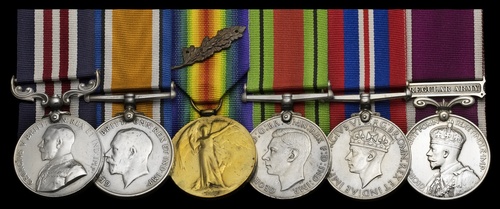
Auction: 24003 - Orders, Decorations and Medals
Lot: 194
A North Russia M.M. group of six awarded to Warrant Officer E. H. Hatcher, King's Royal Rifle Corps, who served in Murmansk, North Russia in 1919
Military Medal, G.V.R. (12560 Pte E.H. Hatcher. K.R.Rif:C.); British War and Victory Medals with M.I.D. oak leaves (12560 Pte. E.H. Hatcher. K.R.Rif.C.); Defence and War Medals 1939-45; Army L.S. & G.C., G.V.R., Regular Army (6838305 Sjt. E.H. Hatcher. M.M. K.R.R.C.), all court mounted for display, contact wear, some well-polished, overall about very fine to very fine (6)
M.I.D. London Gazette 8 July 1919.
M.M. London Gazette 2 January 1920.
Ernest Henry Charles Hatcher was born on 21 February 1898 at Brixton, Lambeth, London and was the youngest of four children to Albert Hatcher, a house painter, and his wife Emily. Hatcher was working as a draper's assistant prior to the outbreak of the Great War and enlisted with the King's Royal Rifle Corps on 19 May 1915. He served at home until embarking for France and Flanders with the British Expeditionary Force on 19 May 1917, returning home to England on 14 February 1919. Hatcher received a special Mention in Despatches by Field Marshal Sir Douglas Haig as a Private in the 13th Battalion in France and Flanders, gazetted on 8 July 1919.
Hatcher served with the No. 1 Special Company King's Royal Rifles Corps in North Russia (Syren Force), Murmansk Command. He embarked for Russia with his Regiment on 10 April 1919 aboard the H.M.T. Porto at Tilbury, disembarking at Murmansk on 4 April. The Syren Force was commanded by General Charles Maynard and was immediately entrained to Soroka where they began training. Ahead of the advance into Bolshevik-held territory, three columns were formed with the No. 1 Special Company in the Right Column. The operation's first objective was to capture Maselskaya station, and then to move forward and unit the town of Medveja Gora. Maselskaya was taken on 3 May by the Centre Column, with the Company arriving as reinforcements three days later. On 15 May the King's Royal Rifle Corps, together with the Middlesex Company, attacked and took a village north of Medveja Gora, capturing many prisoners and leaving 40 Bolsheviks dead. Four days later, the Company was ordered on a reconnaissance patrol in the woods, where they encountered an enemy force. The skirmish resulted in casualties, but they were able to keep the enemy from advancing.
On 22 May the Company moved into Medveja Gora, which had been taken by other companies of the Force the previous day, where they adopted garrison duties there over the following weeks. The evening of 6-7 June, they participated in a successful night attack on the Bolsheviks at Siding 10, south of Medveja Gora, and was later involved in another attack alongside the Middlesex Regiment on 23 June, during which they were subject to a heavy barrage of machine gun and shell fire, resulting in a forest fire and over 25% heat casualties - forcing the attack to be broken off. On 3 July, the Company was ordered to relieve the Italians at Kapaselga Village, where they fortified and held outposts for the rest of the month until withdrawing to Medveja Gora on 31 July for some much-needed rest. In August, they were engaged in an attack on Siding 8, did guards and other fatigues back at Murmansk, and guarded bridges up to 100 miles south of Murmansk. The evening of 3-4 October, the Company entrained to Murmansk where they embarked for home on HM.T. Ulua, arriving at Glasgow on 12 October and there entraining for the Rifle Depot at Winchester, where the men were initially absorbed into the four Reserve Battalions.
Upon his return home Hatcher was awarded a M.M. 'for bravery in the Field with the British Forces in North Russia', appearing in the London Gazette on 2 January 1920. The 1919 King's Royal Rifle Corps Chronicle elaborated upon this award: 'for good work as Signaller when alone on duty with the right column'.
Hatcher was posted to India on 19 September 1922 and served there with his Regiment for over nine years, returning to England on 16 January 1932. As a Corporal at Poona on 14 April 1924, he qualified at a Regimental Signalling Instructors Course and later at Lucknow on 28 October 1928 he earned a First-Class Army Certificate of Education at the rank of Sergeant. At some point during his service in India, Hatcher must have returned to England for a period as he was married on 17 September 1829 at the Lambeth Register Office to Gladys Bradbury. He is recorded in 1931 as residing at 139 Ferndale Road in Brixton; his childhood address.
After his posting home, Hatcher was made a Warrant Officer Class II on 15 March 1934 and was later discharged on 18 May 1936, his conduct cited as 'exemplary' and given glowing recommendations by his superior officers. He was, however, later recalled in November 1939 in the rank of Warrant Officer.
Hatcher later died on 31 October 1981 with his address at the time of his death listed as 107 Derby Road, Beeston, Nottingham; sold together with a binder of comprehensive copied research, including medal rolls, war diary, copied certificates, detailed accounts of the actions of the KRRC in North Russia, and photographs of Hatcher with fellow rifleman Prime Minister Anthony Eden.
Subject to 20% VAT on Buyer’s Premium. For more information please view Terms and Conditions for Buyers.
Sold for
£650
Starting price
£650




